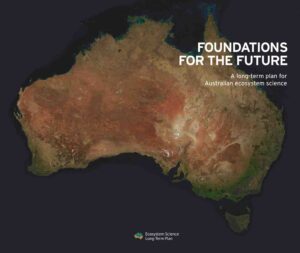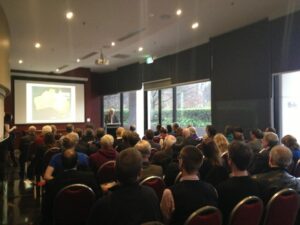TERN’s collaborative networks have been put to good use by the ecosystem research community in many ways. The launch of the first long-term plan for Australian ecosystem science earlier this month exemplified the vital role these networks play in enabling the ecosystem science community to connect, collaborate and deliver for the Australian community as a whole.
Launched by the Chief Scientist of Australia Prof Ian Chubb AC, Foundations for the future: a long-term plan for Australian ecosystem science sets out the vision, key directions and priorities for a national ecosystem science capability that will enable Australia to understand and manage its ecosystems for decades to come.


Foundations for the future sets out the long-term vision, key directions and priorities for Australian ecosystem science (left).
Speaking at the launch A/Prof Glenda Wardle, a member of the Steering Committee for the project said, ‘Taking up the tough challenges we face as a nation the ecosystem science community asked: what can we do to contribute more effectively to the national wellbeing? In short, what strategy is needed to deliver excellent science for the benefit of Australia?’
Those questions initiated a yearlong consultation process that drew over 600 people together from across Australia’s ecosystem science and management communities. TERN worked in close collaboration with the Ecological Society of Australia, and the Australian Academy of Science to coordinate the consultation, and our strong collaborative networks were vital in enabling this extensive consultation and delivery of the plan.
Our wide-ranging network across the ecosystem science community, including people across Australia’s universities, research agencies, government departments, industry, and NGOs, provided a well-established framework for engaging an ever-widening circle of people in the development of the Plan. A variety of mechanisms, such as online surveys and town hall workshops, enabled anyone with an interest in ecosystem science to get involved and have their say on the future of ecosystem science in Australia.
When launching the plan Prof Chubb noted, ‘This is another illustration of how we’re doing that [collaboration] better.’
‘The process of bringing people together across disciplines and traditional divides has established a firm base for a stronger and collaborative future.’
Thanks to this process of bringing people together, the final plan represents the concerns, priorities and hopes of the ecosystem science community for the future of ecosystem science, Australia’s ecosystems, and the country’s national wellbeing. It is the first time the collective ‘voice’ of the diverse ecosystem science community has been achieved, captured and shared.
This is a landmark achievement for the ecosystem science community, and a significant leap forward for our capacity to deliver for the needs of Australia. By continuing to work collaboratively towards our shared vision, we can put in place today the strategies and actions that will ensure we have the evidence, knowledge and skills to meet the needs of the Australian community tomorrow, and for years to come. TERN looks forward to continuing its role in providing the tools, infrastructure, and networks that will enable the ecosystem science community to build this bright future.
Click here to read Foundations for the future: a long-term plan for Australian ecosystem science


Members of the steering committee celebrate the launch alongside Prof Chubb and Prof Jagadish, the Vice-President of the Australian Academy of Science. Back row (L-R): Prof Stuart Phinn (TERN Associate Science Director), Prof Chubb, Prof Mark Westoby, Prof Andy Lowe (TERN Associate Science Director); Front row (L-R): A/Prof Glenda Wardle, Prof Jagadish, Dr Bek Christensen (TERN Communication and Engagement Manager), Prof Kris French.






